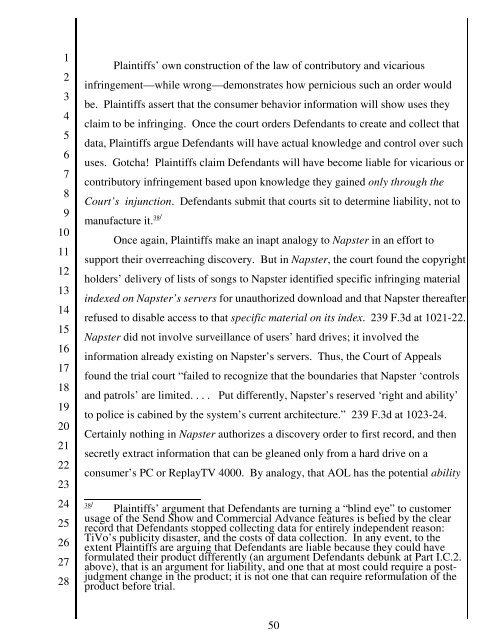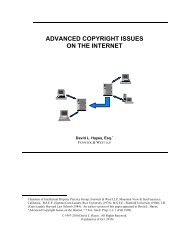Paramount Pictures Corporation v. ReplayTV, Inc., Joint Stipulation ...
Paramount Pictures Corporation v. ReplayTV, Inc., Joint Stipulation ...
Paramount Pictures Corporation v. ReplayTV, Inc., Joint Stipulation ...
Create successful ePaper yourself
Turn your PDF publications into a flip-book with our unique Google optimized e-Paper software.
12345678910111213141516171819202122232425262728Plaintiffs’ own construction of the law of contributory and vicariousinfringement— while wrong— demonstrates how pernicious such an order wouldbe. Plaintiffs assert that the consumer behavior information will show uses theyclaim to be infringing. Once the court orders Defendants to create and collect thatdata, Plaintiffs argue Defendants will have actual knowledge and control over suchuses. Gotcha! Plaintiffs claim Defendants will have become liable for vicarious orcontributory infringement based upon knowledge they gained only through theCourt’s injunction. Defendants submit that courts sit to determine liability, not tomanufacture it. 38/Once again, Plaintiffs make an inapt analogy to Napster in an effort tosupport their overreaching discovery. But in Napster, the court found the copyrightholders’ delivery of lists of songs to Napster identified specific infringing materialindexed on Napster’s servers for unauthorized download and that Napster thereafterrefused to disable access to that specific material on its index. 239 F.3d at 1021-22.Napster did not involve surveillance of users’ hard drives; it involved theinformation already existing on Napster’ s servers. Thus, the Court of Appealsfound the trial court “ failed to recognize that the boundaries that Napster ‘controlsand patrols’ are limited. . . . Put differently, Napster’ s reserved ‘right and ability’to police is cabined by the system’ s current architecture.” 239 F.3d at 1023-24.Certainly nothing in Napster authorizes a discovery order to first record, and thensecretly extract information that can be gleaned only from a hard drive on aconsumer’ s PC or <strong>ReplayTV</strong> 4000. By analogy, that AOL has the potential abilityPlaintiffs’ argument that Defendants are turning a “ blind eye” to customerusage of the Send Show and Commercial Advance features is belied by the clearrecord that Defendants stopped collecting data for entirely independent reason:TiVo’ s publicity disaster, and the costs of data collection. In any event, to theextent Plaintiffs are arguing that Defendants are liable because they could haveformulated their product differently (an argument Defendants debunk at Part I.C.2.above), that is an argument for liability, and one that at most could require a postjudgmentchange in the product; it is not one that can require reformulation of theproduct before trial.38/50
















